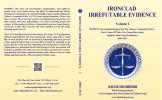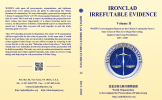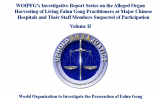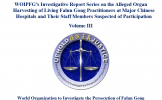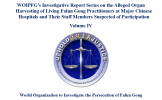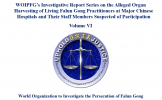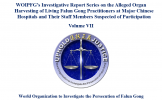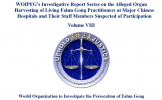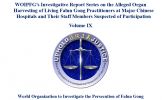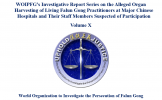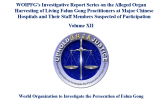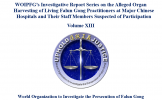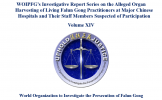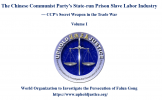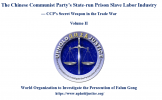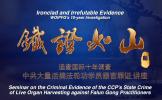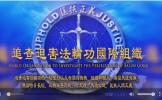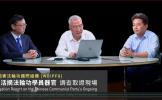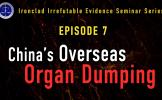Propaganda and Penetration Abroad to Extend the Persecution of Falun Gong Overseas
Introduction
In July 1999, Jiang Zemin initiated the suppression of a spiritual meditation practice that had gained great popularity in China since it was first introduced to the public in 1992. It spread quickly throughout the country as people began experiencing the benefits of this practice that emphasized virtue and the principles of truth, compassion, and tolerance. Jiang lacked a legitimate reason and enough supporters to suppress these practitioners who had no political objectives at all. To change public opinion and garner support, Jiang utilized all available means to generate propaganda, control media, block information exchange, and brainwash the Chinese public. For nearly five years Jiang and his officers have continued to perpetrate violence, lies, and slander in the campaign to eliminate Falun Gong.
Since Jiang clearly knew that violating the human rights of Chinese people on such a large scale was not legitimate at all and would attract criticism from the international community, he changed the traditional way of the Chinese Communist Party (CCP), which was to "carry on a movement with door closed." Instead, he invited the involvement of western officials and western media from the beginning of the persecution, in an attempt to gain their support to make the persecution legitimate, as well as alleviate the international pressure. For example, Jiang Zemin personally conducted "the interpersonal dissemination" activities when he visited six countries in 1999. He also personally declared that Falun Gong was an "evil cult" during a written interview with the French newspaper LE FIGARO. During an exclusive interview with Mike Wallace on the CBS show 60 Minutes, Jiang Zemin (president of China at the time) perpetuated his lies by slandering the founder of Falun Gong, Li Hongzhi, saying that he "claims to be the reincarnation of the chief Buddha, and also a reincarnated Jesus Christ…He said that doomsday was about to come and that the Earth was going to explode." He further slandered Falun Gong by telling 60 Minutes that the practice drove thousands of members to commit suicide.[1] Although none of Jiang's defamatory accusations have any basis in any of Mr. Li's books, they have been extensively used by the Chinese and Western media since then.
A critical part of the Jiang regime's policy of genocide toward Falun Gong is to forcibly brainwash the Chinese people, generate hatred of Falun Gong using its mouthpiece media, and buy or force the overseas Chinese media as well as infiltrate the Western mainstream media to participate in the persecution by systematically brainwashing the people in the world.
1. Carrying out Jiang's "Actively Attacking" Policy and Generating Hatred Using Mouthpiece Media
Jiang Zemin also personally directed the media work including propaganda to overseas. In his speech at the National Overseas Propaganda Work Meeting in 1999, he said, "We should stand on a higher starting point. We should analyze the situation, judge the timing and seize the opportunity. Do research and formulate our future propaganda strategy, do a better job in the foreign propaganda area, so that we have a formidable propaganda power that is compatible with our international status and reputation." [2]
On October 26th, 2001, Ding Guangen, who was minister of the China Ministry of Propaganda and Deputy Leader in the CCP Central Committee "Leadership Group to Handle Falun Gong Issue" at that time, said in the opening ceremony of the First Session Meeting of the Sixth Council Committee of Chinese Reporters Association, "Currently, the number one task of media work is to earnestly study and implement (Jiang Zemin's) important thought of "three representations," voluntarily maintain consistence with the core Central Party Committee led by Comrade Jiang Zemin, and unify everyone's thought and actions to follow the central committee's instructions." He said, "(We need to) deliver the voice of the Party and the government to everyone's home, deliver the voice of China to every place in the world." [3]
On January 9th, 2003, in the National Overseas Propaganda Work Meeting, Li Changchun, a Standing Committee Member of CCP Central Committee Politburo Bureau, proposed to "fully play the functions of the major central committee media that work on foreign affairs," and to "expand the overseas influence. Adopt a means that (Chinese media) ‘go abroad,' and at the same time invite (foreign media) to ‘come in.' Take care of the foreign media and the foreign reporters. Improve the printing quality of the propaganda materials for oversea use, expand the foreign distribution channels, explore the marketing mechanism to distribute the overseas propaganda materials, and use every possible way to deliver our overseas propaganda materials into foreigner's hands." [4]
Many resolutions were issued at this National Overseas Propaganda Work Meeting in January 2003. It was announced that a larger-scale propaganda campaign and penetration actions would take place. Later, according to a proposal by Li Changchun in his speech "to establish an overall coordination mechanism for overseas propaganda work,"6 twenty-five departments in CCP central government established a "Central Committee Overseas Propaganda Joint Committee." It was responsible for overall planning and implementation of the overseas propaganda cases. It was under the leadership of CCP Central Committee Foreign Propaganda Office. The participants included the Ministry of Propaganda, CCP Foreign Propaganda Office, CCP International Department, Ministry of Foreign Affairs, CCP Taiwan Issue Office, Ministry of Finance, Ministry of Education, the Headquarters of Radio and TV Broadcasting Bureau, the National Religion Bureau, the Headquarters of the Commercial Aviation Bureau, and so on. [5]
On April 20th and 21st, 2004, in the National Overseas Propaganda Work Meeting, Li Changchuan, once again emphasized to govern the foreign propaganda works with Jiang Zemin's "three representation" ideology. He said, "(We should) focus on building an international environment that is advantageous to us in terms of public opinion," and "diligently innovate the contents, the methods and means in the overseas propaganda works, strive for more understanding and support from the international community." Li Changchun especially announced that "it is a strategic task in the ideology and propaganda area to strengthen and improve the foreign propaganda." [6]

Xia Lin, deputy general editor of Xinhua News Agency advanced that, investment in the war of public opinions belongs to the category of "national security defense expenses," "there exist two battlefields in the realm of thoughts: one is the propaganda battlefield in China, the other is the international stage of public opinions," and "we should catch every chance and carry out the open strategy of ‘going out (of the country)' advanced by Comrade Jiang Zemin, to create a positive international public opinions atmosphere for China." [7]
Guo Jingzhe, a chief editor in China Radio International shared his experience on the overseas propaganda work in his article "Pay Attention to the Art of Propaganda and Stress on the Effectiveness of Propaganda." He said, "Comrade Jiang Zemin said, ‘(We) should fight an active attacking battle, and strive to take preemptive measures to stay in control. Doing foreign propaganda work is many times just like fighting a battle. We must hold a shield in one hand to defend the enemy's attack, and hold a spear in the other hand to actively attack (the enemy). When we reported the news about banning Falun Gong in China to the outside world, we copied the reports and some special terminology that we used in our domestic propaganda. It was difficult for foreigners to understand and accept. Later, we clearly stated that Falun Gong was an evil-cult in our overseas propaganda, and the foreigners immediately understood and accepted it. This helped us to win support from the international society." [8]
The media has performed well in its reports to overseas regarding the "Tiananmen self-immolation," "murder in the capital," and "the Zhejiang beggar murder by poisoning" among other events that framed Falun Gong. It has clearly been following Jiang's order: "for the foreign propaganda, the media needs to actively attack Falun Gong, forestalling the opponents by a show of strength, and keep timely news." (Details on the Investigation Report of Some Chinese Media Participating in the Persecution of Falun Gong, by WOIPFG.)
2. Buying or Forcing Overseas Chinese Media to Participate in the Persecution
The U.S. census shows more than 60% of Chinese Americans speak limited English, and mainly rely on Chinese media to access information. So Chinese newspapers are the main sources of information for them.[9] However, four major Chinese newspapers and most Chinese broadcasting and TV in America has been influenced or even controlled by the Chinese government.
The Jamestown Foundation, an independent non-profit organization in the United States has published an article entitled "How China's Government is Attempting to Control Chinese Media in America" in its November 21, 2001, issue of China Brief. The article revealed the four strategies Communist China has been using to control and influence the Chinese media in the US.[10]
(1) Directly control newspapers, television stations, and radio stations through complete ownership or owning major shares;
(2) Government use economic ties to influence independent media who have business relations with China;
(3) Purchase broadcast time and advertising space (or more) from existing independent media;
(4) Deploy government personnel to work in independent media, achieving influence from within.
Sing Tao Daily's most representative article was published shortly after September 11, 2000, in which Falun Gong practitioners' pictures were put together with the leader of the Japanese Aum doomsday cult. People didn't have to read the article since just looking at these pictures left people with a bad impression on Falun Gong. [11]
The lawyer who represented Falun Gong practitioners in the case against the China Press said that, between the time when Jiang Zemin issued the order to start persecuting Falun Gong on July 20, 1999, to May of 2002, in a period of two years and seven months, the China Press had published three hundred articles with negative messages to attack Falun Gong, averaging one article every three days. In addition to massively reprinting articles from the Chinese government's media, they also came up with their own commentary articles that basically sold the same point of view as the Chinese government's media. Being a media company and not publishing any single positive report on Falun Gong indeed makes people question their purpose. [12]
Les Presses Chinoises in Canada published an article on page 31 on November 3, 2001, "Voices from Victims of Falun Gong." The entire article did not list any actual facts; instead, it was full of scornful language. This kind of article is also used by China's media to import back to China to prove that overseas Chinese are against Falun Gong. [13]
3. CCP Utilizes Various Means to Exert Control Over the
Overseas Chinese Media and Influence the Direction of the Global Media
WOIPFG notices that the CCP is using the World Chinese Media Forum and the World Chinese Newspaper Association as its tools to exert control over overseas Chinese media from all directions.
From September 16 to 18, 2001, the First World Chinese Media Forum was held in Nanjing. It is said that 150 top executives of over 130 Chinese media from more than thirty countries and areas in five continents attended the meeting. Over 60 news agencies from Mainland China participated in the meeting as well. Top Chinese officials in charge of propaganda and unification attended the meeting and made instructional speeches. [14]


The topics of the forum include "localization and role of overseas Chinese media," and "how to enhance cooperation between overseas Chinese media and media in China." Attendees fully discussed the strategy of using CCP's ideology to lead the propaganda campaign overseas and create favorable public opinions towards China in the international community. [14]
What was worth mentioning was that some overseas media promoted anti-Falun Gong propaganda at the forum, slandering and making lies towards the Falun Gong cultivation group. These media groups that participated in anti-Falun Gong propaganda are:
The Australian Chinese Times in Australia: its publisher Zhu Minshen gave a speech at the forum. He said, "Because of the new immigrants' deep and strong tie to their native country, The Australian Chinese Times has taken the initiative to establish good working relationship with China's major medias." "The Australian Chinese Times has published articles with very clear stance and message on the major issues such as Taiwan independence, Tibet independence, denouncing NATO bombing, and exposing the nature of Falun Gong, etc." [15]
On August 13, 1999, The Australian Chinese Times published an article attacking and slandering Falun Gong, making a stance of following Jiang Zemin to persecute Falun Gong. (Figure 4) This article was reprinted by the People's Daily and other CCP media. [16]
CEO of China Star TV in Chicago of the US, and publisher of Chen Bao under China Star Media Corporation, Dai Wei was a former Chinese Communist Official. She said in her speech given at the forum, "Three years ago, the China Press stopped printing in the Mid-US, resulting in no official or semi-official newspaper representing China in the Mid-US. There are even newspapers that slipped to the extreme right wing and published articles that call for the formation of "Federation Opposing the Communism," or articles supporting Falun Gong, Democracy Movement, or Tibet Independence. Chen Bao is the only newspaper that does not publish Falun Gong articles." (Note: Dai Wei's original name is Zhou Diehui. She is the former member of Hebei Provincial Communist Youth League; Standing Committee member of the Political Consultation Conference of Handan City, Hebei Province; Standing Committee member of Women's Association of Handan City; Vice Chair of Youth Association; China Author's Association member; and Chinese Artist Association member.) [17]

The World Chinese Media Association held its first annual meeting in Beijing. High ranking people from the media industry in Singapore, Malaysia, Mainland China, Hong Kong, Macao, Taiwan, Japan, the United States, Hungary, and Canada attended the meeting. Standing member Li Changchun of CCP Politburo Bureau who was in change of propaganda visited the attendees of the meeting. The CCP Propaganda Department Head Liu Yunshan gave an opening speech. [18]
Through the World Chinese Media Forum and the World Chinese Media Association annual meetings, it is evident that Jiang's regime is trying to unite overseas Chinese media, and attempting to influence the direction of the world media. It has two purposes. First is to have overseas media boast its foam economy so as to attract foreign investment to sustain the whole huge system. Second is to use economic interests as bait to intimidate overseas media. Whoever produces reports in line with Xinhua News Agency would be rewarded with business favors. By doing so, Jiang's regime is enticing overseas Chinese media to become its mouthpiece in the overseas.
4. The So-called "Borrowing the Ships to Go to the Sea" Is a Very Important Channel and Means for the CCP's Official Media to Launch Overseas Propaganda Campaign
"Borrowing the ships to go to the sea" is a term used to describe the practice that Chinese media take charge of editing articles and designing layouts of certain pages of overseas media, and then have overseas media publish the articles to help the CCP's overseas propaganda. Jiang Zemin's regime intends to achieve two goals with this practice. The first goal is to create a false impression of foreign countries "supporting" the persecution of Falun Gong by re-printing articles prepared by Chinese official media in China but published by overseas media. Then, import them back into China to mislead and deceive people in China, and to coerce them to take part in the persecution. The second goal is to influence world media through overseas Chinese media, and brainwash global Chinese or even westerners. Through such long-term brainwashing, they plant hatred in the hearts of overseas Chinese, gradually exporting the CCP's ideology to overseas Chinese and citizens of various countries. As a result, elected government officials in various countries may be negatively influenced by their citizens' misunderstanding of Falun Gong, thus preventing them from actively condemning the persecution, which might even influence the policy and decision-making of their countries.
The so-called "borrowing the ships to go to the sea" is a very important channel and means for the CCP official media to launch an overseas propaganda campaign. It can be spotted from the main points of overseas propaganda work in Heilongjiang Province.
The main points of overseas propaganda work in Heilongjiang Province in 2003 were stated as follows:
"(We) must closely center our work on the grand strategy that has been established by the provincial party committee and the provincial government."
"(We must) elaborately plan and carefully organize the battle of overseas propaganda campaign and overseas propaganda activities."
"(We must) make an effective use of various expos, trade shows and cultural exchange activities to carefully organize our campaign of foreign propaganda. Such activities include ‘Harbin Fair for Trade and Economic Cooperation,' ‘Harbin International Ice and Snow Festival,' ‘International Ski Festival,' ‘China International Winter Sports Merchandise & Winter Garments Exhibition,' ‘Expo on Green Industry' and ‘Harbin Summer Concert.' We must use all kinds of propaganda means, adopt all different kinds of propaganda forms and intensify our efforts in overseas propaganda works."
"(We) must fully play the role as a bridge of our international media and overseas media and continue to strengthen our cooperative relationships with the official Chinese and CCP's international media, such as CCTV-4, CCTV-9 (English), China Radio International, the International Department of Xinhua News Agency, China News Agency, China Daily, People's Daily Overseas Edition, as well as the mainstream overseas media and overseas Chinese media, such as Associated Press (AP), Reuters, CNN in the U.S., NHK in Japan, Russian Public Television, the Europe Daily in France, Phoenix TV and so on. We must improve our planning and enhance our timely cooperation with them based upon the different focus of our propaganda campaign at different times. We should actively invite these media to come to our province for interviewing and reporting, and at the same time, we should produce some selected programs to send to them, exchange or share our channels with them, provide news information or materials to them and publish some special editions on specific topics."
"(We) must reinforce our cooperation with and supervision of Heilongjiang correspondents of Hong Kong based Ta Kun Pao and Wen Wei Po, as well as China Daily and the U.S.-based International Daily News Heilongjiang Special Edition. We should strengthen our communication and relationship with them, and study and formulate our propaganda and reporting plans together. We should persist in the policy of primarily reporting news in a positive way. We must do research and master the overseas public opinion, make sure these media reporting Heilongjiang Province in a correct, accurate and unique way, and make a good effort in continuously increasing our influence." [19]
The CCTV-4 Foreign News Department places very important focus on "borrowing the ship to go to the sea." It actively provides news to CNN. In 1999, 140 pieces of news were provided to CNN, which then broadcasted all the news provided. [20]
The U.S.-based International Daily is the second largest Chinese language newspaper and it is headquartered in Los Angeles. It mainly serves Chinese in the United States and Canada. On October 15, 1999, approved by News Office of China State Council, the International Daily agreed to create a special edition called China News. Soon after, an editorial department called "International Daily-China News" was established inside the Shantou City Economic Special District News Office in China, beginning to help make and edit the China News page in the International Daily overseas. After 15 days of preparation, they were ready to publish China News. Starting from November 1, 1999, they provide eight pages of news to International Daily through the Internet. The news contents include "Mainland China Headline News," "Summary of News from China," "Mainland China Economy," "Mainland China Society," "Mainland China Sports," "Mainland China Film and TV," "China Touring," "Digest," "Stock," "Medicine and Health," etc. The publication of China News page in International Daily and Thailand-based China News in Jinghuazhongyuan Daily expanded the Chinese media's influence overseas, and opened a new field for the Chinese government to carry out its overseas propaganda campaign.[20]
According to International Daily Board Director Xiong Delong, the International Daily survived the financial difficulty by "lending its ship to Chinese media." The International Daily had been losing money every year since its creation in 1981. Xiong said it survived after it found out its special way of doing business, such as reporting local news in a timely manner, and cooperating with the newspapers in China, using our own network and publishing news prepared by Chinese media. "Borrowing the ships to go to the sea" made it possible to timely deliver the information of China to overseas Chinese." [22]
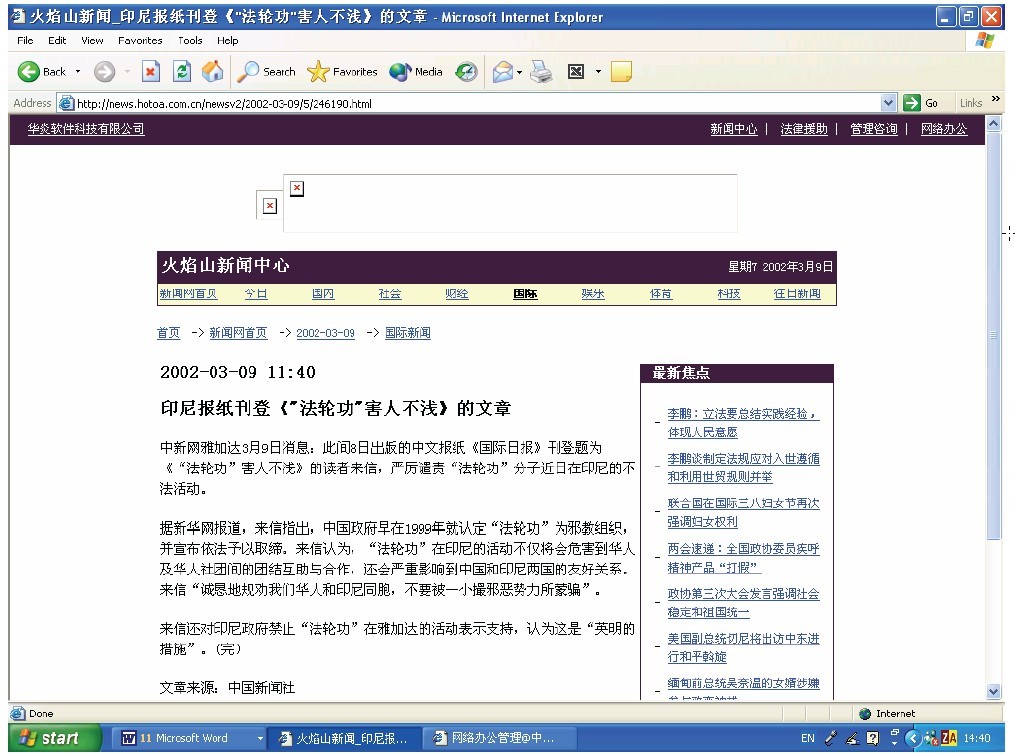
Figure 5. China News Net reported the anti-Falun Gong article published on the International Daily.
The Indonesian edition of the International Daily published the CCP's propaganda attacking Falun Gong. The Chinese official media then recited the news and reported it back to China. The China News Net reported on March 9, 2003, from Jakarta, Indonesia, that on March 8, the local International Daily published an article "Falun Gong is Very Harmful." (Figure 5)
The chief of The Australian Chinese News, Jin Kaiping had the following suggestions on the ways of cooperation between media from China and overseas (using the newspaper for an example):
(1) Joint funds, joint operation;
(2) Limited cooperation
A. Exchange newspaper sections
B. Exchange advertisements
C. Contracting sections: Media from China is responsible for the different sections in the Australian Chinese newspapers. Chinese side is to regularly provide contents, drawing, design and editing while Australian side just receives and inserts add-on materials. China pays a certain amount of money to reimburse costs of printing and distribution. This is a simple and feasible way. [23]
On March 29, 2004, the Southern Chinese Daily News, with its headquarters in Houston, Texas, published an article titled "Ten Saddest Events in 2003," which contained the story "Zhejiang beggars were murdered by food-poisoning" exactly the same as what was published by Xinhua News Agency. This story fabricated that the person who had murdered many beggars by food poisoning was a Falun Gong practitioner.[24] The WOIPFG has a detailed investigation report regarding this case. [25]
The Southern Chinese Daily News later acknowledged that it had made a mistake and apologized to Houston Falun Gong practitioners. The spokesperson for the Southern Chinese Daily News indicated that the newspaper's "News from China" page was typeset and sent from China everyday for printing in the United States. The error was made because the editor on duty that day did not carefully scrutinize the page layout.[26] Apparently, directly sending the typeset layout of an entire page of "News From China" has become a routine avenue for the Chinese government to bring its propaganda overseas.
5. The International Channels of China Central TV (CCTV-4 and 9) Export Hatred Overseas Through Gradual Immersion
As the largest official TV station in Mainland China, CCTV has invested an enormous amount of fund in overseas propaganda. Its broadcast has now covered over 120 countries, and is gradually invading the mainstream society of western nations such as the United States, Great Britain, France, and so on. The hate propaganda towards Falun Gong, as an "important event" and "important policy and law," has always been the focus of the Jiang regime's propaganda in the past few years. Needless to say, such hatred has naturally been exported to many countries over the world.
CCTV's broadcast overseas covers large areas around the world
On April 28, 2004, during an interview by a reporter, Zhao Huayong, president of CCTV, made these remarks, "In recent years, CCTV's oversea propaganda has continuously broadened its target area. The overseas propaganda channels and the amount of broadcast time have multiplied, reaching the stage of 24-hour non-stop broadcasting. In addition, CCTV has rapidly increased its network establishments in foreign countries, reaching the total number of over 120 nations and regions. As a result, CCTV has successfully emerged into the western mainstream societies. Meanwhile, CCTV has set up cooperation with 208 media entities in 134 countries and regions." [27]

Zhao Huayong also said, "For CCTV-4 and CCTV-9, in order to reach greater touching ground in the world, CCTV has been actively carrying out a project named "Go to the Outside" and has made dramatic progress in recent years: there are two channels now instead of one broadcasting in foreign countries, and the amount of broadcast time has increased from 24 hours to 48 hours a day [by 2 channels]. CCTV-4 has established its network in over 100 nations and regions in North America, Europe, Asia, Africa, Oceania and Central South America. CCTV-9 has established its network in America, Africa, Europe and Hong Kong of our country, and is gradually entering the mainstream societies of western countries such as the United States, Great Britain and France, which in turn, has increased our nation's international influence. CCTV will still actively seek multi-level cooperation with overseas media. For instance, cooperation in producing programs."
When talking about CCTV's goal and plan of 2004, Zhao Huayong said that in 2004, CCTV will "put more effort in broadcasting, further reform both the method and tone of the propaganda, and actively set up multi-language and multi-channel international broadcast network. On January 1, 2004, programs in Spanish has been formally broadcasted, and on May 1, 2004, the fifth English channel will be completely reformed, and at the same time, set up the overseas propaganda platform in North America. The overseas Chinese news channel and Chinese culture and entertainment channel will be opened before the year 2005." [27]
According to an investigation, on September 25, 2000, China launched its first English television channel, CCTV-9, broadcasting to worldwide English-speaking audiences 24 hours a day. After the broadcast signals are digitally compressed, CCTV-9 and CCTV-4 together broadcast worldwide through nine transponders on eight satellites. The broadcasts have covered 98% of the Earth's surface. The English Television Channel broadcasts worldwide through the networks of CCTV.

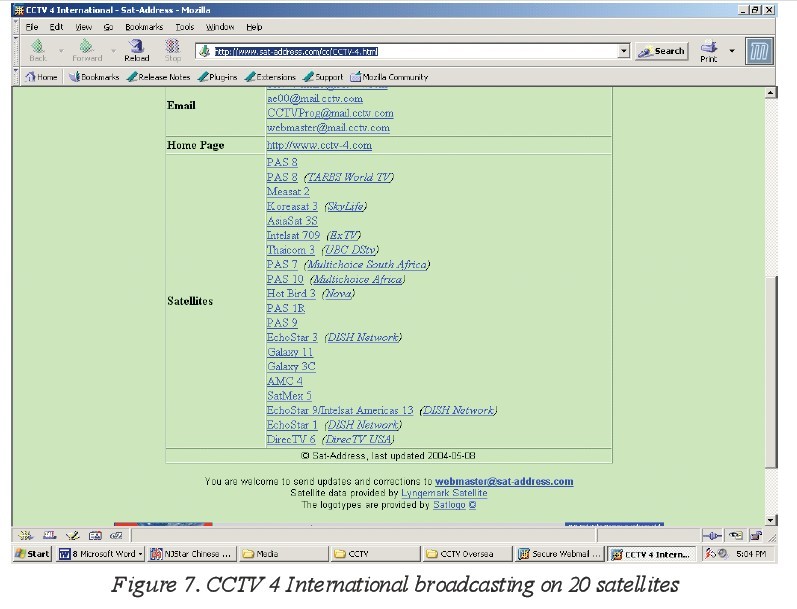
Within the past four years, the number of satellites used to broadcast CCTV-9 and CCTV-4 has increased from eight to thirty-seven. Considering the fact that only six satellites are used to broadcast to Chinese citizens in China, people can gain some insight of how the CCP is making efforts to brainwash overseas Chinese and the people of the free western world in ideology. [28]

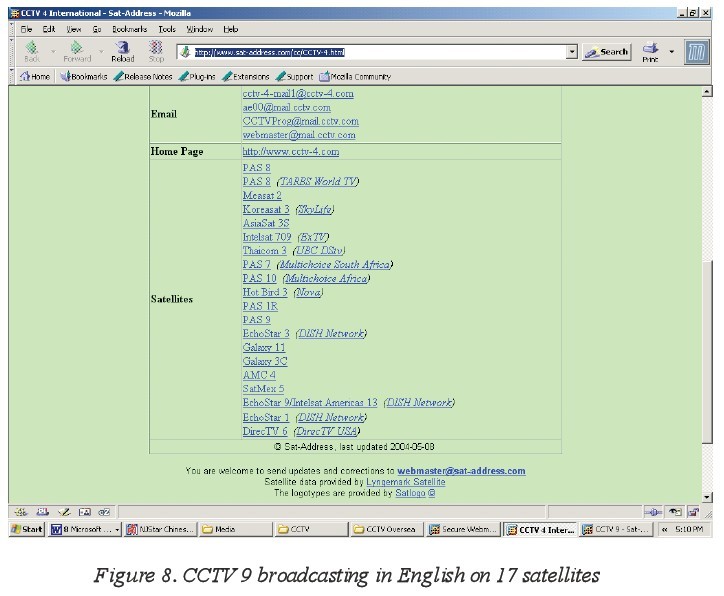
CCTV Intensely Covers up Facts and Fabricates Lies to Achieve its Goal for Propaganda
Former foreign expert of CCTV-9 Ms. Joan Maltese worked at the CCTV for one and half years from 2002 to 2003. Speaking of her work experience at CCTV, she said, "we did not follow the ethics of journalists." "Because there were news inspectors from the government sitting right in our office, sometimes they changed the initial news draft that we wrote. I am fully aware of this." With regard to her Chinese colleagues, she added, "in fact, they think following the [Chinese] government's instruction to cover up the truth so as to make China look good is a very natural thing to do."
"Because the media is, basically the representative of the government. If you go to the Chinese media to point your finger at them: you lied, you boasted the government, and then right away, you would be in trouble. In addition, there was only one voice. In China, there was one official voice. … Therefore Chinese people do not have the chance of getting to know what others say, what likely the story would be out of other interviews if possible." [29]
From the following CCTV reports on some major events, it is not difficult to perceive how intensely CCTV has covered up facts and fabricated lies. In 2003, while SARS was spreading, instead of reporting the real situation of the SARS epidemic, Chinese state-owned media claimed that SARS was "effectively under control" in China, and encouraged foreign tourists to visit big cities in China. Jiang Zemin's accomplice, Minister of the Chinese Public Health Department Zhang Wenkang candy-coated the epidemic outbreak to the whole world through CCTV. He covered up the fact that SARS had spread overseas. As a result, SARS was spread to many foreign countries, causing thousands of deaths. [30]
CCTV Takes Advantage of Satellite TV to Spread Hatred Propaganda Worldwide
On May 26, 2000, CCTV's Focal Point Interview program broadcast a 18-minute-long special program on attacking Falun Gong. After the leader of the CCP Central "610 Office" reviewed the program, he ordered CCTV to copy this program to videotapes, and then send them to overseas Embassies and Consulates. At the same time, he also asked CCTV to translate the program into English and broadcast it overseas. [31]
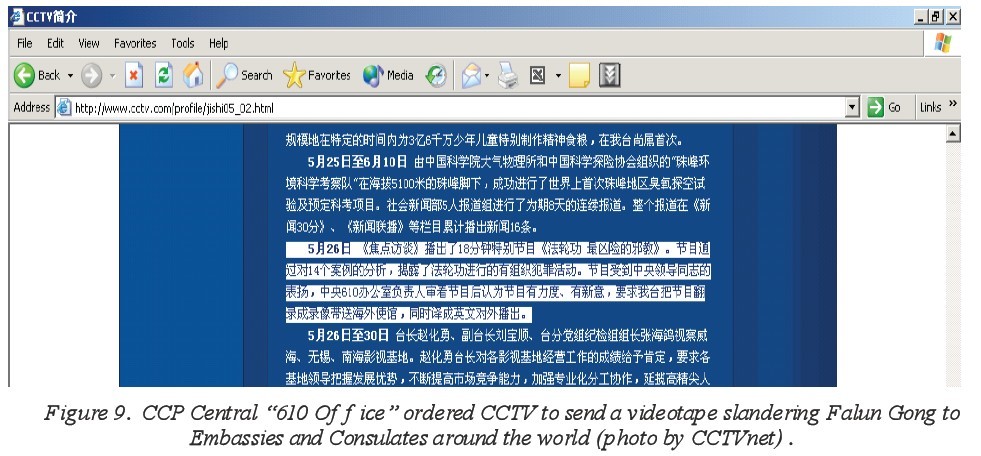
As a matter of fact, in the last five years, CCTV has been continuously producing hate-inducing propaganda against Falun Gong. (For more information, please refer to the WOIPFG investigation report on the media). Moreover, CCTV delivers these propaganda programs to overseas via Satellite TV. The so-called "Tiananmen Self-immolation," "Fu Yibin Murder Case in Beijing," "Poisoning beggars in Zhejiang" and other incidents were broadcast to cast blame on Falun Gong and incite hatred worldwide. According to a report by CCTV, "A big color TV is placed in the lobby of the Chinese Embassy in Britain, on which programs from the CCTV-9 are shown to people who come to apply for visas. On the day the correspondent arrived, he witnessed that many Chinese waiting for visa application were absorbedly watching the video on ‘Falun Gong Practitioners Self-immolate at Tiananmen Square.' Some children were stunned by what was shown on TV." [32]
On February 1, 2001, Xinhua Net reported, "the special program recently broadcasted on CCTV about Falun Gong cruelly harming lives has caused great shock and anger among overseas Chinese people in France." [33]
On August 16, 2002, the Radio Standard Committee in Canada (RSCC) issued a ruling to the complaint regarding the Chinese City TV Station in Canada's re-broadcast of a murder case report (so-called "Bloody Murder in Capital") from CCTV. The verdict pointed out that the re-broadcast of the CCTV report linking a murder case in China with Falun Gong by the Chinese City TV Station on December 16, 2001, has violated the "Professional Ethics Guideline" and the "Guideline on Violence" created by RSCC, as well as four regulations in the "Media Professional Ethics Guideline" from the Radio and TV News Chief Editor Association. The arbitration group from RSCC believed that it was groundless to link the murder with Falun Gong. It was an attack on Falun Gong… And the group requested that the Chinese City TV Station broadcast their verdict during prime time. [34]
6. Officials of Chinese Consulates Lead the Propaganda Infiltration of Overseas Chinese Media
The World Organization to Investigate the Persecution of Falun Gong (WOIPFG) notices that among those who attend the CCP's conference of overseas media work, there are high ranking officials of different levels (including provincial level) as well as officials from Chinese consulates in western countries, including the United States. It shows that Beijing has those officials lead the propaganda infiltration of overseas Chinese media in those countries.
From February 25 to 27, 1999, CCP's National Conference for Overseas Media Propaganda was held in Beijing. Government leaders at the time, such as Secretary General of the Chinese Communist Party, Head of the State, and Chairman of the Military Committee, Jiang Zemin; Standing Member of the Politburo and Head of the Secretary Office, Hu Jintao; Standing Member of the Politburo and Vice Premier Li Lanqing; Member of the Politburo and Vice Premier of the State Council, Qian Qichen; Member of State Affair and Secretary General of State Council Wang Zhongyu; and officials from related offices attended the conference. It was reported in the CCP's periodical Opening Up and Wide Spreading, No.1 Issue of 1999, as follows: "Those who are in charge of the overseas propaganda work in different areas, head of the central government offices, spokesmen, head of the news agencies, and some comrades from overseas consulates attended the conference." "Jiang Zemin gave an important speech at the conference. He emphasized that the overseas propaganda work should be handled well from a higher starting point. We need to form a powerful propaganda force in the international community that matches the status and reputation of our country." "People attending the conference agree that Jiang Zemin's speech highlights the strategic role, the mission, and guiding principle of the overseas propaganda work. He gave requirements and directions to the work." [35]
In the Chronicle of Events of CCTV, there is a record of a meeting between President of CCTV, Zhao Huayong, and Chinese Ambassador in Germany, Lu Qiutian, on October 11, 2000. Zhao introduced to Ambassador Lu the situation of CCTV-4 and CCTV-9 touching ground in overseas. He hopes that Ambassador Lu will continue to follow up with the work of getting the two overseas channels' touching ground work. Lu expresses that "he is going to make due suggestions to the head of Ministry of Foreign Affairs that overseas propaganda work via TV be listed in embassies and consulates' agenda of priority." [36]
A Chinese scholar in the U.S., Mei Duzhe, wrote in his article, "Staff in Ming Bao Office said their real boss was the Chinese Consulate in New York. Whatever the consulate says, they will follow." In his research report about CCP's infiltration of overseas Chinese media, Mei Duzhe points out, "Chinese consulates in New York and San Francisco contacted the offices for local page of World Journal in the two cities, pressing them not to carry Falun Gong advertisement. World Journal in New York has completely agreed. San Francisco only partially agreed. Although they carry Falun Gong advertisement in San Francisco, 90% of the time the advertisement is arranged to appear in the least important places." [10]
Influencing or Buying Off the Overseas Chinese Language Media
(Note: The information in this section only reflects the situation at the time the incidents occurred or the investigation was being conducted, and may not be happening now.)
Overseas Chinese language media has been reporting issues differently than western mainstream media. It has a lot of things to do with the infiltration of CCP power's penetration. The Jamestown Foundation is an American non-profit independent organization. In its China Brief on November 21, 2001, there is an article entitled "How Chinese Government Attempts to Control Chinese language media in U.S." The article reveals that the CCP put great effort into infiltrating overseas Chinese language media with strategies like getting sharehold through investment, using business interest in Mainland China (this method has a great influence on the contents of the news in broadcast and press), purchasing air time and commercial slots from independent media, providing free and ready-made programming by (Chinese) government, arranging government people to work in the independent media and function from inside. A lot of Chinese language media are bought off or they are afraid of offending the CCP. [10]
There was a newspaper named US-China Evening in Texas. It was established on September 17, 1999. It was first named US-China Time (Dallas) and published every weekend with 24 pages. It was renamed as US-China Evening on January 10, 2000, and published from Monday through Friday daily. Right now, it publishes 12 pages from Monday to Thursday (the front and back page are printed in red color), 36 pages on Friday (6 of the front and back pages are in color). It has a distribution of 10,000 in the Greater Dallas area and in Austin, the capital of Texas, all free of charge.
The US-China Evening introduced itself to the readers as: "When the Chinese government and people reached the peak of ‘criticizing Falun Gong,' there was a newspaper, for several months, continuously carrying on entire page-long articles like ‘CCP Rampantly Cracking-down Falun Gong, the Perpetrators Cannot Shake off the Responsibilities,' as well as large Falun Gong advertisements. It has caused a temporary clamor of the Falun Gong organization in Dallas." "US-China Evening insists on two principles: anti-Falun Gong and anti-independence of Taiwan." It also provides reports to Chinese news media such as People's Daily, China News Agency and Sohu Net. [37]
According to Guangzhou Chinese Voice, No.1 issue of 2003, from December 1 to 7, 2002, the Overseas Chinese Office in Guangzhou and Press Office of the City Government jointly invited overseas Chinese language media, such as The China Press in U.S. (Western U.S. section), Ming Bao (Western Canada section), Les Presses Chinoises in Canada, Australian Chinese Times in Australia, and New Mid-land in Thailand. The investigation report by the WOIPFG shows that apart from Les Presses Chinoises from Canada, the other four media all have a very strong background of Chinese government. The China Press established in 1990 is directly under the control of the Chinese government. Its characteristics are to report honestly and timely the official news from China. Ming Bao is "heavily influenced by Chinese government." The news of the launch of Australian Chinese Time was first reported by China News Net, the most famous official News Net in Mainland China. In late February of 2001, New Mid-land published an editorial attacking Falun Gong, which was quoted by China News Net as evidence of an anti-Falun Gong tide overseas, so as to cheat the readers.[39]
On December 8 and 18, 2003, the spokesman for the Chinese Consulate General in Sydney, Australia, had 2AC Chinese Daily published his speech on Page Two. His speech denounced Falun Gong as "killing over 1700 people," and accused Falun Gong to be "the same as the ‘Aum Shinrikyo' in Japan…" In addition, it incited the Australian people "not to be decieved and taken advantage" and "not to support them or participate in their activities." Chen Jinzhong, chairperson of the Australian 2AC Chinese Language Media Board and Huang Chengwei, editor-in-chief of the 2AC Chinese Daily are mainly responsible for the slander incidents. [40]
On November 3, 2001, the Montreal Les Presses Chinoises published a page full of articles defaming Falun Gong in succession. Over 200 Falun Gong practitioners in Canada filed a lawsuit with the Quebec Superior Court against Les Presses Chinoises and the author of the articles, He Bing, for slandering and instigating hatred. On December 10, 2001, the Quebec Superior Court held the first hearing and issued a restraining order prohibiting Les Presses Chinoises from publishing further anti-Falun Gong articles. In the following two court hearings, two other judges on duty at the Superior Court extended the restraining order twice. However, Les Presses Chinoises ignored this restraining order and continued to slander Falun Gong. It published several pages of articles targeting Falun Gong on November 10, 2001, November 24, 2001, December 8, 2001, January 5, 2002, and February 2, 2002 respectively. On February 2, 2002, it published a 12-page anti-Falun Gong insert, which brought up the case of the contempt of court from the slander case.40 In his indictment statement, His Honor Mr. Jean-Louis Beaudoin, a senior judge at the Quebec Superior Court, indicated that La Presses Chinoises Inc. published and circulated on its website materials that allegedly seriously offended the appellants. The members of Falun Gong were accused of a variety of criminal behaviors including, subversion and sabotage. It appears that most, if not all of these texts, were taken from quasi-official statements made by the Chinese government, which has apparently attempted by various means to prevent the spread of the Falun Gong's doctrine and to discredit its members in certain expatriate Chinese communities.
The Les Presses Chinoises Defamation Lawsuit has gone through eleven court hearings, and the final arguments were presented by both sides in late February 2004. A verdict will be reached by the Supreme Court.
Chinese Consulates Harass Overseas Newspaper Offices
According to VOA's report on March 13, 2001, at the beginning of March, Consul General Wang Yunxiang of the Chinese Consulate in San Francisco wrote a letter to World Journal in San Francisco, requesting them not to carry Falun Gong advertisements anymore. At the end of his letter, Wang said, he hoped that "World Journal would be able to see the will of people in Bay area and stop carrying Falun Gong advertisement. Otherwise, World Journal's image might be damaged."
The Vice General Manager of World Journal in San Francisco, Gu Xixian, said, it is natural that readers have various opinions about a newspaper. If you say "general readers," it is an abstract word. How many would that be? Do you have a specific statistic to support the term? It makes people ponder the issue. "He can give his opinion from his point of view. So can Falun Gong."[42]
According to the evidence provided by Australian Falun Gong practitioners to Minghui Net, the Consul General of the Chinese Consulate in Melbourne, Australia, Wu Ronghua, invited people in charge of Chinese language newspapers and other media for dinner on October 23, 2000. During the three-hour dinner, he kept warning the leaders of medias not to carry Falun Gong related articles. Information from a newspaper office shows that the Consulate had set a rule for them. If they are going to carry any Falun Gong's articles, they have to fax it to the Consulate for approval. If it is not approved by the Consulate, they cannot carry the article. That's why every newspaper discreetly refuses to carry any Falun Gong articles. They repeatedly expressed that they were under too much pressure. Though furious at the Consulate's rule, they dare not say anything, being afraid of retaliation from the Chinese government. Many of them have some business relations with China and, in addition, some have families in China as well. [43]
Independent Media That Dare to Tell the Truth Are Slandered and Attacked
On November 5, 2003, the Australian Chinese Daily (Liu Meiling, President; Wu Huiquan, Editor-in-chief) published an article "submitted by the Chinese Consulate General in Sidney" on Page Four. It attacked the independent media that dare to honestly report news about the persecution of Falun Gong, such as the New Tang Dynasty TV, the Epoch Times and Fang Guang Ming TV (FGMTV), headquartered in North America, as well as the Minghui School and the Australian Tongsong Music Art Troupe. [44]
7. Media Industry: Used by the Chinese Communist Party to Intensify Overseas Propaganda
On the afternoon of September 18, 2001, Deputy Chair for the Overseas Chinese Affairs Office of the State Council and Director of Zhongxin News Agency Liu Zepeng gave closing remarks at the first World Chinese Media Forum held in Nanjing: "In the past 20 plus years, the media industry in Mainland China has entered into a period of vigorous development. We have 2,000 newspapers, 8,000 magazines, and 1,500 Radio and TV stations in the country. For three years in a row, profits from the media industry have been increasing at an annual rate of 40%. In 1998, for the first time in history, after-tax net profit from the media industry exceeded that from the tobacco industry. The media industry has become one of China's back bone industries." [45]
In February 2003, the National Overseas Propaganda Work Meeting was held in Beijing, and a series of motions was passed, with an aim to enhance overseas propaganda work. Soon after, 25 units within the central Chinese government formed a new unit for the purpose of coordinating and expanding overseas propaganda. Jiang Zemin gave a speech at the meeting. The host of the meeting, CCP Overseas Propaganda and State Council News Office Chair Zhao Qizheng said that in the past several years, "overseas propaganda has been obviously strengthened, has made major progresses, and formed a solid foundation." Now it is time to use the power from the Chinese economy to strengthen and expand overseas propaganda, "opening a new era of overseas propaganda work."
Exactly how much money Beijing gives to American Chinese newspapers, TV, and other media, remains a secret. Former Hong Kong Branch Director of Xinhua News Agency said that through his hands, Beijing gave China News, a pro-Beijing newspaper published in the United States and Hong Kong, US$30 million. The State Chairman at that time, Yang Shangkun, said there should be "no cap" on the funds to support overseas propaganda, which means however much money is needed is how much Beijing should provide. [46]
Before the 16th Party Congress on August 25, 2002, Xinhua News Agency and all big newspapers in China announced that the CCP decided to hold the 16th Party Congress on November 8, 2002. On August 26, 2002, the CCP Propaganda Department held a meeting attended by 106 people. The attendees included ministers and secretaries of the Propaganda Department, heads of propaganda departments from each province and autonomous city and region, heads of members of the Central Propaganda Leaders' Group, representatives from various departments of the central government, directors of the Propaganda Department from People's Liberation Army (PLA) Political Bureau, PLA News office, the National Union of Women, Workers and Youths, as well as the Sciences Association. This important meeting was approved by the central government. Besides the 16th Party Congress, Li Dongsheng, the deputy head of the Propaganda Department, notified the situation of exposing and criticizing "Falun Gong." Jiang Zemin spoke at the meeting. [47]
Before and after the 16th Party Congress, there were new newspapers established overseas in many regions. Some media were short on money, but suddenly increased pages and circulation. Another important change in these newspapers is that their views changed from neutral to nearly pro-communist (to be more accurate, pro-Jiang Regime). They reported extensively on Jiang and his cohorts whom Jiang managed to promote into the Political Bureau of the CCP Central Committee at the 16th Party Congress. This was the result of Jiang and his regime bribing overseas media. From then on, these media have kept their views completely in line with Mainland China. (Note: Contact WOIPFG if you are interested in these references.)
8. Long-Term CCP Overseas Propaganda Misleads Overseas Chinese People
Because the CCP manipulates overseas Chinese media to publish propaganda defaming Falun Gong practitioners, many overseas Chinese people have misunderstood Falun Gong, or even developed a hostile attitude towards Falun Gong practitioners.
Case 1:
On June 30, 2003, when a CCP official residing in the U.S. was visiting New York City, Falun Gong practitioners peacefully appealed outside the place where he was having a meeting. However, they were beaten up by a group of people led by New York Chinese United Association Chair Liang Guanjun, who has a close relationship with the CCP. Two practitioners were wounded. Falun Gong practitioners reported this incident to the police. Police from New York City's No. 5 Station charged Liang Guanjun with 3rd degree assault. The U.S. Congress has also had a briefing on this incident. [48]
Case 2:
In Melbourne, Australia, during last year's Chinese Spring Festival Celebration, Falun Gong practitioners' application was turned down with the excuse of "booths are all taken." They then visited the organizers' committee. The staff the practitioners talked to emphasized that they did not have spare booths, but a person in charge told practitioners frankly, "If we give you a booth, we will not be able to host this event next year … We are running a small business, and need the money to support our family…" He refused, however, to say who it was that was threatening him. He said during the conversation with practitioners that the Chinese Consular had planned to come join the event, but threatened not to come if Falun Gong appeared in the celebration. Obviously, this is the reason that Falun Gong practitioners were not allowed to join the Chinese Community's activities. [49]
Case 3:
On January 24, 2004, the Paris City Government held a Chinese Spring Festival Parade on Champs Elysees Avenue that was open to the public. As a legally registered organization, Falun Gong practitioners in France had the right to attend such an event. But in order to block Falun Gong practitioners from joining the event, Jiang and his regime threatened the Paris City Government, saying that if they let Falun Gong join the parade, it would cancel all of the celebration activities. In less than one week prior to the scheduled parade, the Paris City Government rejected the application from Falun Gong practitioners. [50]
9. Use Modern Telecommunication Methods to Spread Hatred
9.1 Rivalry Over the Fourth Media: Internet
As the fourth media after newspaper, radio, and television, the Internet has become another tool for Jiang's regime to suppress Falun Gong. An article often quoted by many Chinese news websites is titled "It's a Very Important and Urgent Task to Build up Marxism's Position on the Internet." It pointed out, "Recently, an important aspect of the battle between us and Falun Gong is to contend for public opinion and audience on the Internet. Therefore, the Party and central government especially emphasizes to particularly recognize the effect of the Internet. On one hand, we shall fully utilize the Internet to broadcast the voice of our party and government more frequently and strongly; on the other hand, we shall strengthen the Internet's technical administration and restrict the spread of counteractive and harmful content. We shall draw experiences from this fight and think in depth about how to strengthen the Marxist position on the Internet. This is not only a long-term strategic task but also a very important current and urgent task. It is extremely meaningful to the full success of this political battle." [51 ]
On October 16, 1999, the CCP Central Office issued document No. 30 (1999) titled "Suggestions on Strengthening the Media Broadcasting on the Internet by the CCP Propaganda Department and Central Overseas Propaganda Office." This was the first guiding document from the central authority about the media and broadcasting work on the Internet. The document raised the importance of Internet media to the level of "Contending for the ideological and public opinions in the 21st century." It established the direction for the future tasks of Internet media broadcasting and provided regulatory principles for Internet news broadcasting.
Right after this first document, the National Bureau of Radio Broadcasting, Motion Pictures and Television issued a "Notice to Strengthening the Administration of Broadcasting Radio, Motion Pictures and TV programs on the Internet." The notice specifically stated that: "Broadcasting radio, motion pictures and TV programs on any channels—including the Internet—inside China requires an approved application by the National Bureau of Radio Broadcasting, Motion Pictures and Television. Such programs broadcasted in China through the Internet cannot use such names as ‘Internet Radio Station,' ‘Web Center,' ‘Web TV,' etc. All the news programs that are approved for broadcast in China through the Internet (including general news and special coverage programs) should be produced and previously broadcast by radio stations and TV stations inside China." In other words, the people (Internet users) in China can only watch those programs that have been modified and cut.
In the CCP Conference of Ideological and Political Tasks on June 28, 2000, Jiang Zemin said, "The Internet has become a new and important front for our ideological and political tasks. The enemy forces inside China and overseas are trying their best to use the Internet to contend with our Party and government for the public and young people. We should study its characteristics and adopt strong measures to face such a challenge. We shall actively attack and strengthen our positive propaganda and influence on the Internet. Leadership in all levels shall pay close attention to and study the new trend of Internet development, diligently acquire knowledge about the Internet, become good at working with the Internet, and gain control of the fight for the Internet."
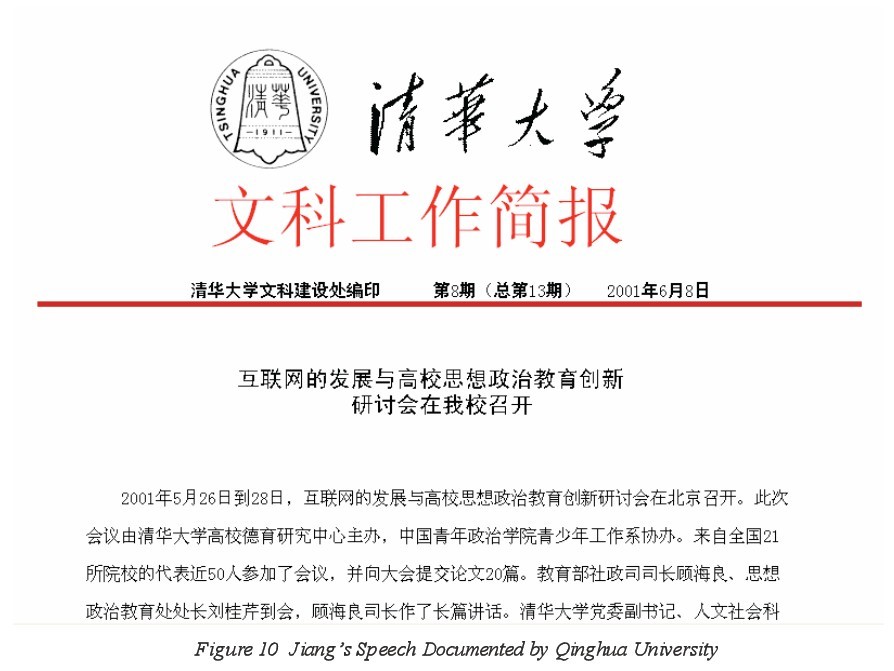
On January 10, 2001, Jiang Zemin said in the National Conference of Propaganda Department Heads, "We shall tightly control the media and maintain our leadership and control position." "Media guidance is an extremely important area for strengthening our Party's leadership. In modern society, all media, especially Internet information highway, have grown rapidly. It requires more and more of our guidance. The media is the mouthpiece for our Party and the people and it should propagate central Party Committee's will accurately, brilliantly, and vividly… The direction should be dominated by positive propaganda and broadcasting extensively the patriotism, collectivism, and socialism…" He asked the officials in charge of propaganda at all levels, "To pay close attention on the Internet media, actively develop tools and fully utilize them. We shall strengthen the control, use the good part and avoid the bad side of it to improve our influence and battle effectiveness on Internet media and make it the new battle position of our ideological and political tasks as well as a new channel for our oversea propaganda." "We should strengthen our Internet media propaganda and increase the information volume, coverage, and our influence. The Internet should become a new territory for our ideological and political tasks and a new channel for our overseas propaganda. We should use it for guiding people in China with correct media direction as well as establishing good image for China overseas." "We should adhere to the Marxism media viewpoint and communist party's media work guidelines." "Create the positive media atmosphere."
9.2 Vigorously Support and Spread Government-Controlled News
Websites
On July 24, 2000, at a CCTV regular meeting, Sun Yusheng, the deputy editor general of CCTV conveyed the essence from the Internet Work Task Conference. The conference announced the five big websites that are supported by the CCP Central Committee are: People's Daily Website (PEOPLE.COM.CN), China News Agency Website (Xinhuanet.com), China Daily Website (CHINADAILY.COM.CN), China Radio International Website (CRI.COM.CN), and China Internet Network Information Center (CNNIC.NET.CN). The other five big websites that should be publicized are: EASTDAT.COM, QIANLONG.COM, CYCNET.COM.CN, CCTV.COM, and CNRADIO.COM.CN. Other commercial websites should not be publicized.
Based on the above strategy on Internet media by Jiang's Regime, China invested great amount of money and human resources on building and expanding the networks for those Internet websites recognized by the central authority. "In order to increase the investment on hardware, the budget approved by National Planning Committee for building the infrastructure of the five key news websites has been in place. All the websites have added equipments, upgraded the technology, and expanded the services. Recently the Department of Treasury again provided certain amount of money as annual operational costs for those five key websites of Chinese mainstream media."
"The five key news websites of Chinese mainstream media signed contract with a US company Genuity to establish mirror websites in US with 100M bandwidth. Since the establishment of the mirror sites, the oversea visiting volume has doubled or tripled. The download speed has become 10 times as fast."
According to CPCW website, Chinese government is likely to issue a series of regulations to control the news broadcasting on Internet, mainly in three areas. 1) Prohibit website from issuing news. Websites can only quote news already published in other newspapers or magazines inside China. 2) Prohibit Internet company from hiring reporters to cover news. 3) Related government departments have established funding of one billion Yuan to help conventional media setting up websites.[52]
Contrary to the CCP's expanding their overseas propaganda vigorously, no overseas Internet news programs of radio or television (including general news and special news coverage) are allowed to enter China. Programs of Voice of America and Radio Free Asia are being interfered with by the CCP government. Major US newspapers are prohibited from circulating in China. Even the websites of the US major media are also blocked. However, the CCP has infiltrated overseas, influenced and controlled Chinese media oversea. Through the method of "borrowing the ships to go to the sea," they are broadcasting their directional ideological thinking and brainwashing oversea Chinese imperceptibly.
References:
[1] CBSNews.com, "Jiang Zemin Talks With Wallace," Aug. 31, 2000,
http://www.cbsnews.com/stories/2000/08/31/60minutes/main229663.shtml(Back)
[2] Jiang Zemin's speech at the National Overseas Propaganda Work Meeting(Back)
[3] Ding Guangen's speech at the opening ceremony of the first meeting in the 6th Committee Meeting of China Journalists Association,
http://www.pladaily.com.cn/gb/pladaily/20 01/10/30/20011030001023_China.html (Back)
[4] Chinanews report on January 10 from Beijing: Li Changchun-Keep Up with Good Overseas Propaganda Work and Create a Beneficial International Media Environment,
http://news.xinhuanet.com/newscenter/2003-01/10/content_686307.htm (Back)
[5] Report from the Bignews on August 24, 2003,
http://www.bignews.org/20030804.txt (Back)
[6] Li Changchun: Using "Three Representatives" to lead overseas propaganda campaign,
http://news.xatvs.com/news/newshow.asp?id=81341(Back)
[7] Xinghua Net's Assistant Editor in Chief Xia Lin(Back)
[8] Guo Jingzhe, Head editor of China Radio International(Back)
[9] U.S. Statistics-Chinese(Back)
[10] amestown Report, Volume 1 Issue 10 (Nov 21, 2001) How China's Government Is Attempting To Control Chinese Media In America http://www.jamestown.org/publications_details. php?volume_id=17&&issue_id=638(Back)
[11] Lawsuit against Sing Tao Daily(Back)
[12] Lawsuit against the China Press(Back)
[13] Lawsuit against Les Presses Chinoises(Back)
[14] First Chinese Media Forum Concluded in Nanjing,
http://www.fcm.chinanews.com.c n/2001-09-18/2/257.html (Back)
[15] Zhu Minshen: Growth of Australian Chinese and Development of Chinese Newspaper,
http://www.fcm.chinanews.com.cn/2001-08-21/2/12.html (Back)
[16] People's Daily reported on August 16, 1999: Australia Chinese Times (a Chinese newspaper in Sydney, Australia) reporter Li Changjiang reported on August 13 that an anonymous article published on Australia Chinese Times issued support for the suppression of Falun Gong by the Chinese government,
http://www.people.com.cn/item/flg/news/81601.html (Back)
[17] Keep Pace with Time - Positioning Overseas Chinese Media (By Daiwei),
http://www.fcm.chinanews.com.cn/2001-08-30/2/47.html(Back)
[18] The First Annual Meeting of World Chinese Newspaper Association was held in Beijing(Back)
[19] Key Points of Heilongjiang Province's Publicity Campaign(Back)
[20] CCTV provides news to CNN(Back)
[21] How Should Chinese Newspaper Expand to Overseas Countries,
http://my9w.com/w/w26.htm(Back)
[22] "Establish Overseas Chinese Media Outlets with Unique Features" by Xiong Delong,
http://www.fcm.chinanews.com.cn/2001-09-17/2/203.html(Back)
[23] "China's Media is Bound to Walk Toward the World-Cooperation between China and Foreign Countries is Extremely Favorable," by the director of The Australia Chinese News, Jin Kaiping
http://www.fcm.chinanews.com.cn/2001-08-21/2/13.html(Back)
[24] Southern Chinese Daily News reported on the so-called poisoning of beggars.(Back)
[25] Investigation report of beggar case by the World Organization to Investigate the Persecution of Falun Gong(Back)
[26] Testimony of Houston Falun Gong practitioners(Back)
[27] China Journalism Review: Zhao Huayong: CCTV should transform into a worldwide influential Contents Provider and business operator.
http://www.cjr.com.cn/gb/node2/node2610 8/node27328/node28302/userobject15ai2629663.html (Back)
[28] CCTV live broadcast via satellite TV(Back)
[29] Beiming: An American's Experience of Working for CCTV in China
http://www.dajiyuan.c om/gb/4/4/9/n505659.htm (Back)
[30] Comprehensive coverage on SARS(Back)
[31] The CCTV 2000 Chronicle of Major Events,
http://www.cctv.com/profile/jishi10_01.html(Back)
[32] Report about the British Consulate by the CCTV(Back)
[33] Xinhuanet February 1, 2001(Back)
[34] Appendix to CBSC Decision 01/02-416+ Talentvision re a News Report (Mainland China Murders) II. Broadcaster Response RE: Dec 16th News Story Regarding Insane Killer in China. CBSC File: # C01/02-415 (Back)
[35] The 1999 China National Overseas Propaganda Work Meeting was held in Beijing(Back)
[36] The CCTV 2000 chronicle of Major Events (October 10),
http://www.cctv.com/profile/jishi10_01.html (Back)
[37] Introduction by Sino-US Evening News(Back)
[38] Report by Voice of Overseas Chinese in Guangzhou, First edition, 2003.(Back)
[39] Media Investigation Report by World Organization to Investigate the Persecution of Falun Gong (WOIPFG)(Back)
[40] Photocopy of Australian Chinese News(Back)
[41] Central News Agency July 2 2003: Canadian Superior Court of Justice in Quebec ruled verdict of libel against Montreal based Chinese newspaper "Les Presses Chinoises" by Falun Gong practitioners(Back)
[42] Voice Of America March 13, 2001 report(Back)
[43] Report by Minghui Net on November 5, 2000: "Jiang Zemin and his representatives issued orders to Australian Chinese media."(Back)
[44] Photocopy of Australian Chinese Daily November 5, 2003, Page 4(Back)
[45] Liu Zepeng: Closing speech for the first Global Chinese Media Forum,
http://www.fcm.chinanews.com.cn/2001-09-18/2/241.html(Back)
[46] CCP Consulate directly controls overseas Pro-communist Chinese media,
http://www.epochtimes.com/gb/4/1/5/n442720.htm (Back)
[47] Report on the CCP 16th National Congress(Back)
[48] Behind the Pro-communist Chinese media: large-scale infiltration by CCP cultural affairs agents to incite hatred,
http://www.chinacomments.net/indx9921.htm(Back)
[49] Report on Falun Dafa promotions in Melbourne during the Chinese New Year 2002.
http:/www.minghui.ca/mh/articles/2002/2/19/25252.html,
http://www.clearwisdom.net/emh/articl es/2002/2/25/19232.html (Back)
[50] Zhengjian Digest #55: New Year Arrest and Detention Incident in Paris (2)(Back)
[51] "It's a Very Important and Urgent Task to Build up Marxism's Position on the Internet"(Back)
[52] The final days of old bays network [January 23,2000 17:23:07] (网络的末日)(Back)
World Organization to Investigate the Persecution of Falun Gong
Tel:1-347-448-5790;Fax:1-347-402-1444;
Mail Address:P.O. Box 84, New york, NY 10116
Website: http://www.upholdjustice.org/, http://www.zhuichaguoji.org/


